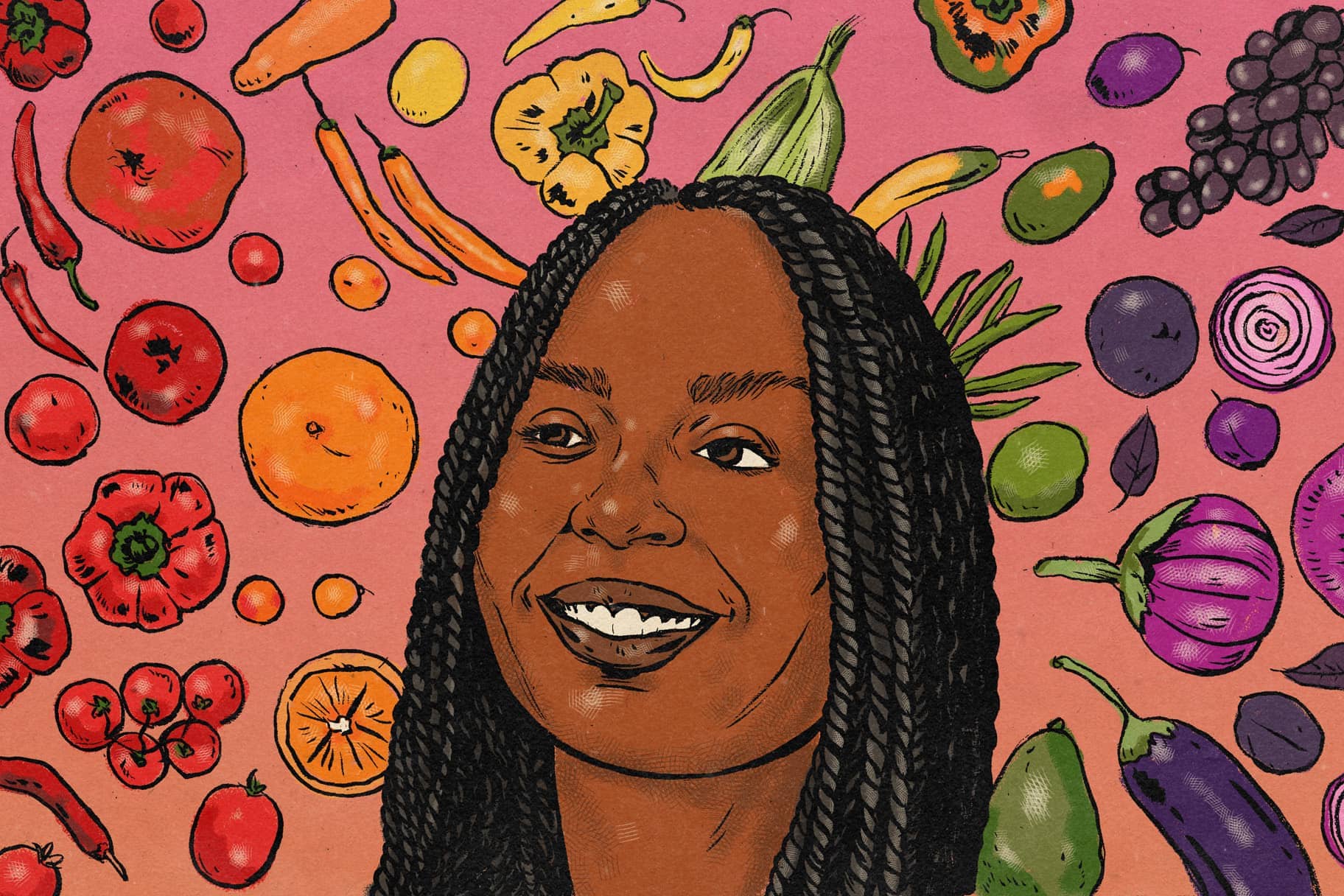Is There a Connection Between What You Eat and Your Mood?
Nutrition
A registered dietitian unpacks the science around the topic.

In conventional medicine, the mind and body have been kept separate for years. Now, emerging research suggests that the two share an inseparable bond. Instilling good nutrition habits is critical to leading a healthy lifestyle, but what about how food affects mood?
The Connection Between Food and Mood
A study published in 2009 (a time when the field of nutritional psychiatry was just beginning to develop) looked at more than 10,000 university students over the course of four and a half years. Researchers were interested in the correlation between how closely the students adhered to a Mediterranean-style diet and whether they developed a depression diagnosis.
The participants included in this study had no diagnosis of depression and were not taking antidepressant medications at baseline. At the four-year follow-up, participants were considered to have incident depression if they reported a physician-made diagnosis of clinical depression and/or antidepressant medication use.
What researchers found during the study: Those who most closely followed a Mediterranean diet experienced a decreased risk of developing depression. It is important to note that this study was correlational, not causal. This means that, from this study alone, it cannot be said that a Mediterranean diet prevents depression — it’s just associated with a lower risk of developing clinical depression. Additionally, family history of depression was not gathered at baseline for the students included in this study.
(Related: 4 Fall Dinner Ideas from a Registered Dietitian)
In addition, a research paper found in the 2017 issue of BMC Medicine made waves in the food and mood space. Why? For the first time, a randomized clinical control trial showed that by enhancing diet quality, mental health (mainly depression) could be also improved.
This landmark study, known as the SMILES trial, investigated dietary intervention as a tool for treating diagnosed moderate to severe depression. Participants were enrolled if they met certain medical criteria for depression and scored "poor" on an assessment of dietary quality. The experimental group followed a modified Mediterranean diet, which consisted of consuming 11 key food groups (and reducing one main food group) for 12 weeks. These included:
- Whole grains (5–8 servings per day)
- Vegetables (6 per day)
- Fruit (3 per day)
- Legumes (3–4 per week)
- Low-fat and unsweetened dairy foods (2–3 per day)
- Raw and unsalted nuts (1 per day)
- Fish (at least 2 per week)
- Lean red meats (3–4 per week)
- Chicken (2–3 per week)
- Eggs (up to 6 per week)
- Olive oil (3 tablespoons per day)
- Reducing intake of "extra" foods, such as sweets, refined cereals, fried food, fast-food, processed meats, alcoholic drinks beyond two standard glasses of red or white wine, and sugary drinks to no more than three per week
The experimental group saw an improvement in their depression symptoms compared to the control group, with depression remission achieved for 32.3 percent of the experimental group and 8 percent of the control group. The experimental group also showed improvements in anxiety and stress.
Another randomized clinical control trial based in Australia — published in a 2019 issue of PLoS One — looked at whether a positive change in dietary patterns of young adults would decrease symptoms of depression. Young adults were included in this study if they had a score of greater than or equal to 7 on the Depression, Anxiety and Stress Scale-21 Depression subscale (this corresponds with moderate or higher depression symptoms), and poor diet that does not comply with the Australian Guide to Healthy Eating (this was established using a validated research tool).
Researchers in this study also looked at whether the degree of compliance (with regards to improving diet) had different effects on depression symptoms. As it turns out, they found both to be true.
Similar to the SMILES trial, at the end of the three-week intervention, the experimental group showed improvements in depression symptoms and this result was maintained at the three-month follow-up. The diet that was used in this study was slightly different than the one from the SMILES trial:
- Vegetables (5 servings per day)
- Fruits (2–3 per day)
- Wholegrain cereals (3 per day)
- Protein (lean meat, poultry, eggs, tofu, legumes; 3 per day)
- Unsweetened dairy (3 per day)
- Fish (3 per week)
- Nuts and seeds (3 tablespoons per day)
- Olive oil (2 tablespoons per day)
- Spices (turmeric and cinnamon; 1 teaspoon most days)
Participants were also instructed to decrease refined carbohydrate, sugar, fatty or processed meats, and soft drinks. And while olive oil, cinnamon, and turmeric may seem random, a 2018 review identified that all three of these foods have a beneficial effect on brain health.
Foods To Consume for Improved Mood
While the ways in which food influences mood are still being studied, researchers and scientists have identified many nutrients that play a positive role. For example, it’s known that consuming plenty of vitamins and minerals from plant foods, protein from high-quality sources, omega-3 fatty acids, and fiber nourishes the brain. It also optimizes the production of feel-good neurotransmitters such as serotonin and dopamine, as well as the calming neurotransmitter, GABA. But there might be additional mechanisms at play.
A review published in a 2019 issue of the journal Antioxidants discussed how consuming more foods with antioxidants can reduce inflammation and oxidative stress — both of which may contribute to depression symptoms. In addition, eating these types of foods can increase a protein called BDNF (brain-derived neurotrophic factor), which is responsible for maintaining brain cell health and producing new brain cells.
Another way nutrients are thought to influence mood is through their effect on the gut. Have you ever experienced the feeling of butterflies when excited? Or even cramping and bowel changes when nervous? The gut and the brain have a bidirectional relationship, which helps to explain this phenomenon. A 2020 review in the BMJ noted that the food we eat has a direct effect on the microbiome (the world of bacteria living in our gut) which, in turn, has an effect on our mood. Emerging research has indicated that bacteria in the gut can influence mood.
So, what foods should be in your weekly grocery haul to improve your mood? According to a review published in a 2018 issue of the World Journal of Psychiatry, the top foods in the animal kingdom for improved mood are mostly seafood. Clams, salmon, snapper, mussels, and trout are rich sources of nutrients such as iron, omega-3 fatty acids (EPA, DHA), vitamin B12, and zinc. Each of these nutrients have a direct affect on the brain. Iron helps bring oxygen to the brain, omega-3 fatty acids are important for brain cell health, vitamin B12 may help with the production of new brain cells and zinc acts on immune cells and supports cell growth.
In the plant kingdom, leafy greens such as spinach, kale, Swiss chard, and fresh herbs as well as peppers, broccoli, brussels sprouts, cabbage, and strawberries top the list for best brain foods by supplying this vital organ with the nutrients it needs.
It's great if you enjoy these foods; however, do not stress if all of these foods do not make it into your diet. In general, the best foods to eat for your mood are foods that include every color of the rainbow. Instead of looking up how much magnesium is in your bowl of berries, think about how many different colors you can consume in a day.
The more colors you have on your plate each day, the more antioxidants, variety of vitamins and minerals, and fiber you consume, which supports the health of your brain, gut, energy levels, and sleep. All of this, in turn, leads to a better mood.
Outside of what to consume, try to limit packaged, processed foods that are high in added sugars — and have multiple ingredients listed on the label. Keep in mind, the studies mentioned above found that people saw improvements in their mood by adding more nutrient-dense foods to their diet, in addition to cutting back on processed foods. However, being overly restrictive with food can negatively impact mood, so feel free to include some processed foods mindfully and in moderation.
Words by Sydney Greene, M.S., R.D.





